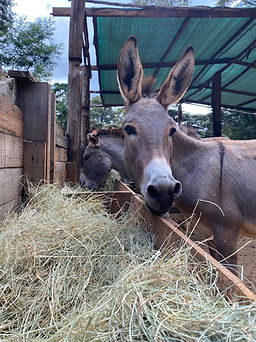AKI's Africa-Based Animal Welfare Organization Grant Program-2024
We're dedicating our 7th annual Grant Program to a great friend and supporter of Animal-Kind International.
Gale Hannigan has been a valued participant in our external proposal review committee since 2019, the first year we created the committee. She declined to participate this year due to health issues, and before she died, she donated a substantial portion of the total amount we've allotted to our 2024 grant fund.
The 2024 grant program is named after her, The Gale Hannigan Memorial Africa-Based Animal Welfare Organization Grant Program.
Our grant program reaches worthy Africa-based organizations, beyond our Partner Organizations, and supports them to implement high impact projects aimed at improving the lives of animals (mainly dogs, cats, donkeys, and horses, and secondarily "livestock": cows, pigs, goats, chickens). This is the 7th year that we've been able to hold the only grant program that specifically targets animal welfare organizations in Africa and that is 100% donor-funded!
The 2024 Grant Guidelines are here
The 2024 FAQs are here
The 2024 AKI Grant Application is here
We received 77 proposals for funding this year! Our 8th annual grant program will open in mid-2025. We'll post dates and information on our website and social media pages.
Watch Videos from our 2024 Grant Recipients
Animal-Kind International's 2024 Grant Recipients
Nairobi Feline Sanctuary is a three-time AKI grant recipient (2020 and 2021) and now, 2024. Part of the sanctuary's roof caved in due to the heavy rains in April and May. That caused extensive damage to the electrical system at the sanctuary. NFS repaired the roof (including mitigating the potential for a recurrence), but the extensive electrical repairs will require an electrician and funds, beyond the limited NFS budget. Their 2024 grant project, Emergency Electrical Repairs, will fund the needed repairs and restore a safe and functional environment for NFS staff and the cats and will allow NFS to resume normal operations, including the proper storage of food and medical supplies. NFS is a safe haven for rescued and stray cats in the Nairobi area with a mission to provide shelter, medical care, and a loving environment for felines in need.


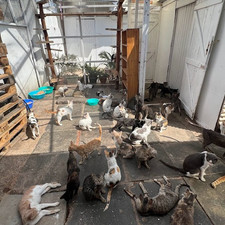
Lake Zone Animal Welfare Organization in Tanzania is a 1st time AKI grantee. Their grant project, Medical Care for New Intakes at Lake Zone Animal Sanctuary, will fund the rescue, medical treatment, rehabilitation, and adoption of street dogs and help LAZAWO expand their rescue/adopt campaign in Mwanza. Specifically, the AKI grant will fund emergency intake of medically fragile dogs, an adoption advertising campaign, and purchase of proper leashes for dogs adopted from their sanctuary. LAZAWO plans to sterilize, deworm, treat wounds and mange, vaccinate, and hold up to 40 street dogs while they await adoption and "hopes that by providing free vaccines and sterilizations, adoption will be seen as a viable alternative to breeding."
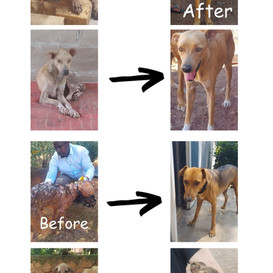
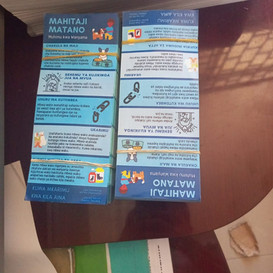

SPCA Grahamstown in South Africa is a 3rd time AKI grantee and this year's grant project is, Siyeza , Vukani! (We are coming, Vukani!) SPCA Grahamstown will conduct a primary healthcare outreach in Vukani township for mange treatments and parasite control, administering rabies vaccinations, providing pet education to the community, and prioritizing sterilizations. Why Vukani? Vukani residents heard about Project Vala in Khayelitsha (the previous AKI-funded grant project) and asked when the SPCA was coming to sterilize in Vukani (see screen shot below). Vukani consists of low-income residents. The housing is a mix of squatter camp and government provided (Reconstruction and Development Programme) houses, the latter being poor quality, basic housing. Conditions are challenging for humans and poor for animals and there are many animals, increasing all the time as litters are added. Mange is also a big problem in Vukani. The SPCA will fund staff salaries, overhead costs, and fuel costs to enable all funds to be allocated for the purpose of assisting the animals in Vukani.
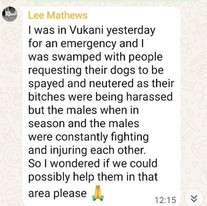
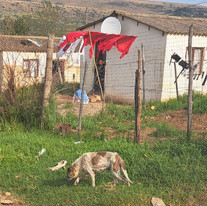


Starting Over Sanctuary in Herut, Israel is a 1st time AKI grantee. Their grant project, Construction of a shed for donkey herds rescued from conflict zones will construct a shelter to house rescued donkeys. The Sanctuary is home to more than 900 donkeys and ~100 horses, most of whom were used to carry heavy loads until they collapsed on the road, sick, starving, some with broken legs, all with deep, bleeding, and contaminated wounds. The AKI grant will also provide funds for vet care for rescued donkeys and horses, like this blind horse, recently brought to the safety of the Starting Over Sanctuary (photo right). Sharon, the founder and manager of the sanctuary was very grateful for the grant: "Thank you very much! What good news! This will help us greatly! Yesterday we got a new horse, He will have to undergo tests and rehabilitation and a very long recovery."
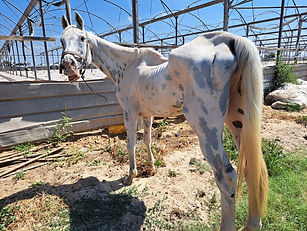
Blind Love in South Africa is a 2nd time AKI grantee. Their grant project, Letsema - ‘Working together to achieve more’ really is all about working together: Blind Love will collaborate with Agripreneur Farmers Institute, a passionate group of young Agricultural College graduates. Together they will provide quality services--good quality sustainable feed and farrier services-- to the cart horse community in Thaba’Nchu. They will hold Farrier Outreaches (photo right) once each month. Rather than simply buying and supplying feed, with this grant, Blind Love will take it one step further and under the expert guidance of their Agripreneur Farmers team, they will buy oat seed and plant it on communal plots. Philippa wrote, "Not only is this a much more sustainable, long term solution, but it will also generate income for those involved. The Agripreneur Team are accredited with our AgriSeta which means any training they provided is fully accredited."
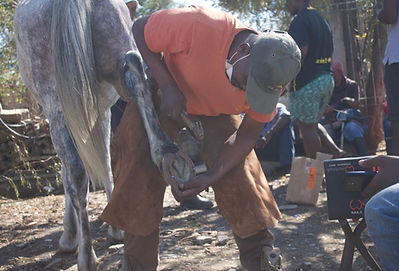
Welfare for Animals Guild Rwanda (WAG-Rwanda) is a 2nd time AKI grantee, having received their 1st AKI grant in 2021. In the 6 months of their 2024 grant, the WAG Shelter Community Spay Program, WAG will spay a minimum of 96 dogs. (4 dogs per week, with 2 sterilization days per week where 2 dogs are sterilized per day). The dogs will also be vaccinated, microchipped, and registered in Rwanda’s National Dog Registration Database, which WAG is leading the implementation of, alongside the Government of Rwanda. At least 12 vets will have the opportunity to participate in the surgeries and gain experience in high volume spay surgery. This will contribute to their professional development and the growth of capacity in sterilizations in Rwanda.
amaTrac uluntu in South Africa will be receiving their 1st grant from AKI for the project, Castration of 28 working donkeys in the Tyhume Valley, Amathole Mountains, South Africa. amaTrac uluntu’s Entrepreneurial Skills Training and Humane Education Programmes empower donkey owners with skills to manage their donkey traction services as a small business, to understand the sentience and welfare needs of their donkeys and to provide better care for them. Donkey owners requested that amaTrac uluntu assist them with castration of their donkeys for the following reasons:
• Male donkeys fight in the breeding season, which results in wounds that prevent the donkeys from working.
• Male donkeys often wander from the village and are often stolen by other donkey owners and by people who sell them for the donkey skin trade.
• Donkeys are usually castrated by a non-qualified veterinarian without tetanus vaccinations, anesthetic, or post operation antibiotics. The donkeys are tied and sat on by community people while the castration takes place. This is extremely inhumane, painful, and terrifying for the donkey.
amaTrac uluntu will use a qualified and experienced veterinarian to castrate the donkeys and to demonstrate --and hopefully expand-- better practices far beyond these 28 donkeys.
Little Paws Big Hearts in Secunda, South Africa is a 1st time AKI grantee. Their AKI grant project, Kennel Building Empowerment Project, will provide critical shelter for animals and empower indigent and unemployed residents to start artisanal kennel building businesses to obtain much needed income. With grant funds, LPBH will purchase pallets, nails, and plastic sheeting and will build 56 kennels for dogs in the areas they serve. Some of the material will be set aside to train three people in each of four areas (Holfontein, Ngobeni, Marikana, and Afghanistan) to build kennels; they'll also be trained in basic business principles and management. LPBH also spays and neuters dogs and envisions this project as a great way for dog owners to take pride in how they care for their pets. A nice new dog house would certainly look (and feel) better than these!:



Tanzania Small Animal Veterinary Organization is a two-time AKI grantee. For their 2nd grant project, Trap, Neuter, Vaccinate, and Return, TASAVO will conduct humane population control of stray dogs and cats together with public awareness on small animal welfare. They'll use locally designed traps for dogs and cats and trap three times weekly to make sure they TNVR at least 5 cats and 5 dogs each week. Their focus is on "problem" areas in Dar es Salaam, where people have complained about the presence of stray dogs and cats. In combination with TNVR, TASAVO will hold community animal welfare education sessions at markets, universities, colleges, local restaurants, and apartments where they'll be collecting the free-roaming animals to TNVR. They'll also establish Animal Welfare Clubs at the University of Dar es Salaam and Sokoine University of Agriculture. Dr. Thomas mentioned that "the recent experience we received with funding from Animal-Kind International helped us to sterilize about 300 dogs and cats, 35 got new homes, 200 civilians got welfare education, 11 vet interns were trained and 20 employees from the government were trained, and we hope to have as much success with the grant this year."
The Kenya Society of the Protection and Care of Animals is a 1st time AKI grantee. KSPCA's grant project is part of a larger project (funded by Brooke East Africa), Emergency Donkey Rescue Programme. The overall goal is to transform the welfare situation for abused donkeys and contribute to the end of the illegal slaughter of donkeys in Kenya by responding to reports of donkeys in acute distress through cruelty, accident, or medical emergency, removing them to a place of safety, and giving appropriate treatment within 12 hours of report; and placing donkeys seized from slaughter in a secure location within 24 hours of request for assistance nationwide. The AKI grant will be used to repair the donkey holding facility at KSPCA Naivasha. This facility is critically important to the overall program. The KSPCA Naivasha facility holds up to 100 donkeys, who are often sick, injured, very old, or starving. (Rescued donkeys at the Naivasha KSPCA facility-->)
